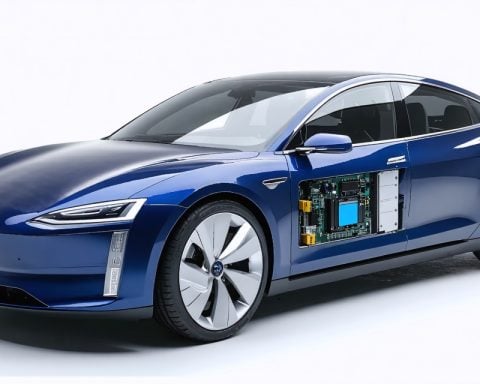- Akasol plans to close its Michigan facilities in Warren and Hazel Park, affecting 188 employees, as operations move to Seneca, South Carolina.
- This shift is part of BorgWarner’s strategic focus on e-mobility and long-term growth.
- The relocation highlights the EV industry’s volatile and fast-evolving nature, impacting workers and regions involved.
- Similar industry moves include the acquisition of Romeo Power by Mullen Automotive, reflecting broader trends in battery production.
- Akasol’s situation reflects the challenges of advancing EV innovation amid business pragmatism and financial pressures.
- The transition underscores the broader quest for efficiency and innovation in the electrification of vehicles.
- The transformation marks a significant shift in the industry, leaving lasting effects on affected communities and employees.
Storm clouds gather over Michigan as Akasol, the electric battery manufacturer, braces to shutter its Warren and Hazel Park locations. Set to extinguish the lights on April 14, this decision casts 188 workers adrift. With silent synchronicity, officials announce the workforce migration to Seneca, South Carolina, a transition that epitomizes the relentless winds of change in the electric vehicle (EV) industry.
Nestled on the site of the former Hazel Park Raceway, Akasol’s plant exudes a sense of fleeting nostalgia—its brief tenure now a testament to the EV sector’s fluctuating fortunes. As part of BorgWarner’s strategic ambitions, the German parent company vows to harness “e-mobility” while recalibrating toward longer-term gains in South Carolina.
The background hums with the whispers of corporate maneuvering. Akasol joins the litany of entities like Romeo Power, swallowed by competitors such as Mullen Automotive, as they navigate the turbulent seas of battery production. The tale unfolds against a backdrop where returns on hefty R&D investments continually battle the demands of business pragmatism.
Akasol’s predicament underscores the EV industry’s laborious march toward scaling innovation while balancing its precarious ledger. This corporate reshuffle paints a vivid tableau: an industry shifting its gears in relentless pursuit of efficiency and emergent e-mobility solutions. Yet, the specter of uncertainty haunts those Michigan workers pondering their place in this swift current of technological progression.
As the outcomes unfold, Akasol embodies both the hope and caution of an industry on the cusp of transformation. Here lies the undeniable truth: the path to electrification is sparking rapid evolution—one that inevitably leaves an indelible mark on people and places tethered to its volatile rise.
The Shocking Truth Behind Akasol’s Michigan Closure and What It Means for the EV Industry
The electric vehicle (EV) industry is undergoing significant transformations as companies like Akasol, a renowned electric battery manufacturer, navigate operational restructuring. The recent announcement of Akasol’s decision to shut down its Warren and Hazel Park locations in Michigan by shifting its operations to Seneca, South Carolina, reflects broader trends and challenges within the EV sector. This shift is expected to impact 188 workers, and highlights the dynamic landscape of e-mobility solutions. Let’s delve into the ramifications, industry trends, and actionable insights relevant to this development.
How-To Steps & Life Hacks: Surviving Industry Shifts
1. Stay Informed: Regularly track industry news and updates on platforms such as Reuters or Bloomberg, which provide insights into corporate strategies and market movements.
2. Skill Upgrading: Workers affected by such transitions should focus on enhancing skills, particularly in emerging technologies and e-mobility, through platforms like Coursera.
3. Networking: Join professional networks such as LinkedIn to connect with industry peers and discover new opportunities in the changing job market.
Real-World Use Cases: Location Transition
The shift from Michigan to South Carolina highlights the significance of strategic geographic positioning in manufacturing. South Carolina offers a more favorable business environment and proximity to Southern suppliers, underscoring cost efficiency and logistical improvements.
Market Forecasts & Industry Trends
1. E-Mobility Growth: The global EV battery market is projected to grow from $16.2 billion in 2020 to $95.3 billion by 2028, driven by increased EV adoption (source: Fortune Business Insights).
2. Corporate Consolidations: The industry is seeing increased mergers and acquisitions, as demonstrated by cases like Romeo Power and BorgWarner’s acquisition of Akasol, suggesting trends toward consolidation for financial scalability.
Reviews & Comparisons: Industry Players
Akasol’s movement signals challenges similar to those faced by peers like Panasonic and LG Chem, who compete in servicing key automakers. The decision to centralize operations can optimize supply chains but may compromise regional job markets.
Controversies & Limitations
– Worker Displacement: Job layoffs create uncertainties for local economies. Community programs and governmental support are often insufficient in addressing the immediate needs of displaced workers.
– Environmental Concerns: While EVs are environmentally friendly alternatives, battery production’s ecological impact remains a concern, necessitating sustainable production processes.
Security & Sustainability
Enhancing the sustainability of battery production involves investing in recycling technologies and reducing reliance on rare earth materials, appealing to environmentally conscious consumers and investors alike.
Insights & Predictions
1. Technological Advancements: Innovation in battery technology, such as solid-state batteries, could disrupt existing markets and redefine competitive landscapes.
2. Dynamic Workforce Models: Future workforce strategies may need to include remote operations and flexible work options to adapt to rapidly evolving sectors.
Actionable Recommendations
– Workers: Leverage online training to gain expertise in high-demand fields like data analysis and renewable technologies.
– Investors: Explore opportunities in emerging battery technologies and renewable energy sectors for high-return investments.
– Companies: Focus on sustainability initiatives to gain long-term competitive advantages and align with global environmental goals.
By reflecting on these insights and adapting to the shifts in the EV industry, stakeholders can navigate the challenges and capitalize on the burgeoning opportunities within the evolving market.













